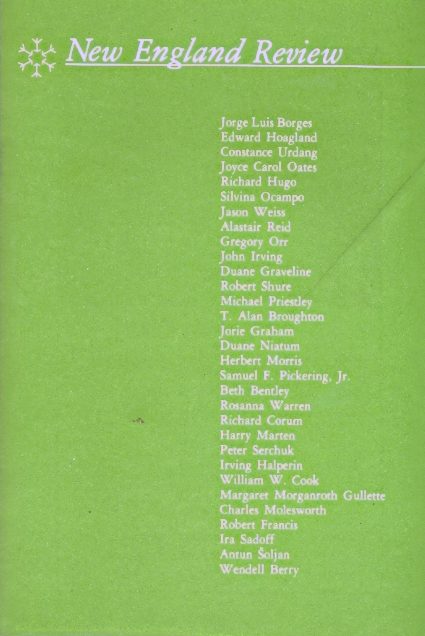
Founding Editor Sydney Lea recalls discovering Herbert Morris’s poem “How to Improve Your Personality,” for NER 1.4 (1979).
The first issue of NER is an anthology of stars, including Robert Penn Warren, who, on seeing it, warned us that such anthologizing should not be our mission. My colleagues and I listened closely: this was, after all, Mr. Warren, about as distinguished a writer as the era knew, and a person, further, who had co-founded the Southern Review. We instantly ceased soliciting submissions and began relying instead on an open-door submissions policy.
The mission on which “Red” Warren had sent us involved a whole lot more work, but I soon learned that the real joy and the real service involved writers previously unknown to me—and in most cases unknown to much of the literary world. There were many such discoveries during those first years: we published the superb fictionist Charles Baxter well before he had a book in print; we anticipated Jorie Graham’s first collection by more than a year; we frequently featured the still first-rate and still under-known Robert Cording; we presented very early English translations of the wonderful Croatian short story writer, Antun Soljan.
And yet to this day there remains a poem that simply grabbed me and that has remained vivid in memory ever since, despite the sad death of its creator in 2001. The poem is Herbert Morris’s “How to Improve Your Personality,” which appeared in summer 1979, just prior to the release of his first book.
In those days, I had a less-than-scientific manner of knowing when I’d hit on something compelling; vague as it was, I know it served me better than any of the tools provided by my training for a PhD. I’d feel a sudden tingle at the very top of my then hair-covered head. When that happened, I knew I had something.
What can I say of “How to Improve Your Personality”? All manner of things were working on me as I first read the poem, and kept doing so as I reread it—just as they did when I reconsidered it this morning, thirty-eight years later. For instance, without my even registering as much, I was surely seduced by Morris’s easy command of the blank verse form. I also clearly observed a social-satiric dimension to the piece, a wry wit, but all that kept being undercut by the poet’s masterful evocation of dread, even doom.
There is also a pervading sense of mystery in the poem, evident right off:
When, in June, you are driven to those suburbs
Where the dark is just beginning to fall . . .
Who is this “you”? Who is driving him or her to which suburbs? Ordinarily such vagueness in a poem that is, after all, quasi-narrative would have put me off; but the obscurity of such details is utterly apt here and only adds to the overarching sense of things, and not especially pleasant ones, somehow closing in on this particular scene.
Herbert Morris, whom I met very briefly once when I was giving my own reading at Penn, went on to a very distinguished career as a poet, winning a Lannan Foundation award, among other distinctions. Though we published him any number of times, our paths never crossed again, which I deeply regret. I scarcely regret, though, that radiating tingle on my head as I pulled “How to Improve Your personality” out of the NER slush pile.
“How to Improve Your Personality” by Herbert Morris
**
Sydney Lea founded New England Review in 1978, with Jay Parini, and served as Editor until 1989. He was Poet Laureate of Vermont from 2011 to 2015, during which time he visited 115 libraries around the state. He has published many collections of poetry and prose, most recently the poetry collection No Doubt the Nameless (Four Way Books, 2016) and the collection of lyrical essays What’s the Story? Short Takes on a Life Grown Long (Green Writers Press, 2016). Lea has received fellowships from the Rockefeller, Fulbright, and Guggenheim Foundations, and has taught at Dartmouth, Yale, Wesleyan, and Middlebury Colleges. He lives in Newbury, Vermont, with his wife and founding NER Managing Editor, M. Robin Barone.
